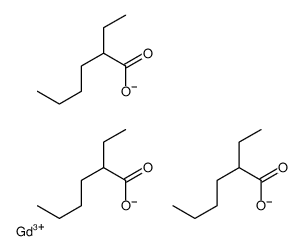gadolinium 2-ethylhexanoate
Modify Date: 2024-01-13 16:10:44

gadolinium 2-ethylhexanoate structure
|
Common Name | gadolinium 2-ethylhexanoate | ||
|---|---|---|---|---|
| CAS Number | 19189-19-6 | Molecular Weight | 586.86000 | |
| Density | N/A | Boiling Point | 228ºC at 760mmHg | |
| Molecular Formula | C24H45GdO6 | Melting Point | N/A | |
| MSDS | N/A | Flash Point | 116.6ºC | |
| Name | 2-ethylhexanoate,gadolinium(3+) |
|---|---|
| Synonym | More Synonyms |
| Boiling Point | 228ºC at 760mmHg |
|---|---|
| Molecular Formula | C24H45GdO6 |
| Molecular Weight | 586.86000 |
| Flash Point | 116.6ºC |
| Exact Mass | 587.24600 |
| PSA | 120.39000 |
| LogP | 2.85810 |
| Appearance of Characters | liquid | viscous |
| Vapour Pressure | 0.027mmHg at 25°C |
|
Section 1: Product Identification Chemical Name:Gadolinium (III) 2-ethylhexanoate (approx. 25% in toluene) CAS Registry Number:19189-19-6 Formula:Gd[OOCCH(C2H5)C4H9]3 EINECS Number:none Chemical Family:metal carboxylate Synonym:2-Ethylcaproic acid, Gadolinium salt in methyl benzene
Section 2: Composition and Information on Ingredients IngredientCAS NumberPercentACGIH (TWA)OSHA (PEL) Title Compound19189-19-625%no datano data toluene108-88-375%50ppm300ppm (ceiling Section 3: Hazards Identification Harmful by inhalation and if swallowed. Irritating to skin, eyes and respiratory tract. May be absorbed through Emergency Overview: the skin. Possible risk of irreversible effects. May impair fertility. Primary Routes of Exposure:Ingestion, eyes, inhalation, skin Eye Contact:Causes moderate irritation of the eyes. Skin Contact:Causes mild irritation of the skin. Harmful by inhalation. Irritating to the nose, mucous membranes and respiratory tract. May cause confusion, Inhalation: headaches, dizziness, fatigue. Ingestion:Harmful if swallowed. May cause abdominal spasms. Irritating to skin, eyes and respiratory tract. Inhalation or ingestion may lead to fatigue, confusion, headache, Acute Health Affects: dizziness and drowsiness. High concentrations may cause unconsciousness and death. Chronic exposure to toluene include anemia, decreased blood cell count and bone marrow hypoplasia. Liver Chronic Health Affects:and kidney damage may occur. Prolonged contact can cause drying of the skin, redness and dermatitis. May impair fertility. Possible risk of irreversible effects. NTP:No IARC:No OSHA:No SECTION 4: First Aid Measures Immediately flush the eyes with copious amounts of water for at least 10-15 minutes. A victim may need Eye Exposure: assistance in keeping their eye lids open. Get immediate medical attention. Wash the affected area with soap and water. Remove contaminated clothes if necessary. Seek medical Skin Exposure: assistance if irritation persists. Remove the victim to fresh air. Closely monitor the victim for signs of respiratory problems, such as difficulty Inhalation: in breathing, coughing, wheezing, or pain. In such cases seek immediate medical assistance. Seek medical attention immediately. Keep the victim calm. Do not induce vomiting as serious lung damage Ingestion: can result if aspirated. SECTION 5: Fire Fighting Measures Flash Point:40°F (toluene) Autoignition Temperature:997°F (toluene) Explosion Limits:1-7% in air (toluene) Extinguishing Medium:carbon dioxide, dry powder or foam If involved in a fire, fire fighters should be equipped with a NIOSH approved positive pressure self-contained Special Fire Fighting Procedures: breathing apparatus and full protective clothing. Hazardous Combustion andIf involved in a fire this material may emit toxic organic fumes. Decomposion Products: Unusual Fire or Explosion Hazards: Flammable material at elevated temperatures. Formation of explosive air/ vapor mixtures is possible. SECTION 6: Accidental Release Measures Eliminate all ignition sources. Small spills may be adsorbed into diatomaceous earth, sand, or other suitable Spill and Leak Procedures: adsorbent, and swept up. SECTION 7: Handling and Storage Handling and Storage:Store in a tightly sealed container and store in a cool place. Handle in a well ventilated area. SECTION 8: Exposure Controls and Personal Protection Eye Protection:Always wear approved safety glasses when handling a chemical substance in the laboratory. Skin Protection:Wear appropriate chemical resistant gloves and protective clothing. Ventilation:Material may form a vapor. If possible, handle the material in an efficient fume hood. If ventilation is not available a respirator should be worn. The use of respirators requires a Respirator Respirator: Protection Program to be in compliance with 29 CFR 1910.134. Ventilation:Material may form a vapor. If possible, handle the material in an efficient fume hood. Additional Protection:No additional protection required. SECTION 9: Physical and Chemical Properties Color and Form:viscous liq. Molecular Weight:586.87 Melting Point:no data Boiling Point:no data Vapor Pressure:no data Specific Gravity:no data Odor:organic odor Solubility in Water:insoluble SECTION 10: Stability and Reactivity Stability:air and moisture stable liquid Hazardous Polymerization:no hazardous polymerization Conditions to Avoid:Keep away from heat and ignition sources including open flame and electrostatic discharge. Incompatibility:oxidizing agents, bases Decomposition Products:Carbon dioxide, carbon monoxide, organic vapors, and metal oxides and carbonates. SECTION 11: Toxicological Information No information available in the RTECS files for title compound. Toluene: Oral (human) LDLo: 50 mg/kg; RTECS Data:Inhalation (human) TCLo: 200 ppm; Inhalation (human) TCLo 100 ppm; Oral (rat) LD50: 636 mg/Kg; Inhalation (rat) LC50:49gm/m3/4H; Intraperitoneal (rat) LD50:1332mg/Kg; Oral (rat) TDLo(reproductive): 7280 mg/Kg. Carcinogenic Effects:No data available Mutagenic Effects:No data available Tetratogenic Effects:No data available SECTION 12: Ecological Information Ecological Information:No information available SECTION 13: Disposal Considerations Disposal:Dispose of according to local, state and federal regulations. SECTION 14: Transportation Shipping Name (CFR):Flammable liquids, N.O.S. Hazard Class (CFR):3 Additional Hazard Class (CFR):NA Packaging Group (CFR):III UN ID Number (CFR):UN# 1993 Shipping Name (IATA):Flammable liquid, N.O.S. Hazard Class (IATA):3 Additional Hazard Class (IATA):NA Packaging Group (IATA):III UN ID Number (IATA):UN# 1993 SECTION 15: Regulatory Information TSCA:Listed in the TSCA inventory. SARA (Title 313):Title compound not listed. Second Ingredient:Toluene (CAS# 108-88-3): listed TSCA: Listed on SARA 313 SECTION 16 - ADDITIONAL INFORMATION N/A |
| gadolinium tris(2-ethylhexanoate) |
| Hexanoic acid,2-ethyl-,gadolinium(3+) salt (3:1) |
| Hexanoic acid,2-ethyl-,gadolinium(3+) salt |